Places to Visit in South Korea offer a unique combination of modernity, history, and nature. It is known for its heritage, natural beauty, and a welcoming atmosphere. From busy cities like Seoul to the peaceful beauty of Jeju Island, there’s something for every type of traveller. Whether you’re exploring traditional Korean architecture or hiking through mountains, South Korea tourist places promise an unforgettable experience. Use this guide on South Korea’s tourist places list for an exciting adventure through its diverse attractions.
10 Best Places To Visit In South Korea
Discover the top places to visit in South Korea, blending history, culture, and natural beauty for an unforgettable travel experience:
1. Gyeongbokgung Palace
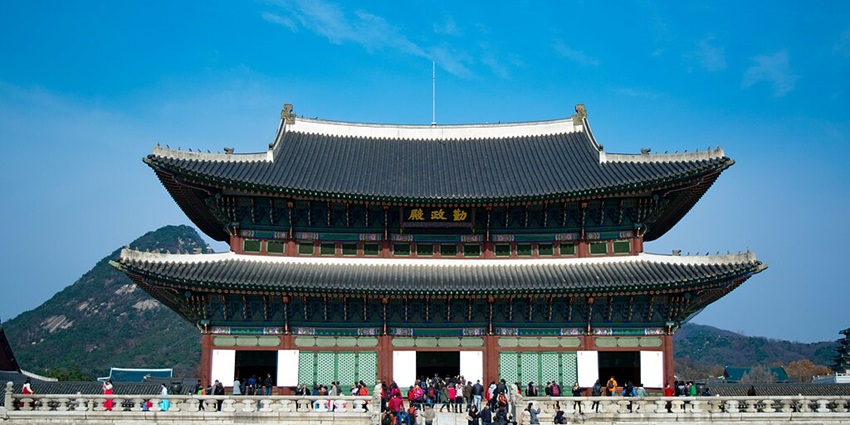
Photo: Brady Bellini / Wikimedia Commons
Gyeongbokgung Palace is the largest of the Five Grand Palaces built during the Joseon Dynasty. It is one of the most iconic places to visit in South Korea. This stunning architectural masterpiece offers insight into the country’s regal past. Explore the palace grounds, admire the elegant structures, and watch the daily changing of the guard ceremony. Spring and fall are the best seasons to experience the palace’s beauty with cherry blossoms and autumn foliage.
Distance From Nearest Airport: 50 km (Incheon International Airport)
Distance From Nearest Railway Station: 1 km (Gyeongbokgung Station)
Timings: 9 AM – 6 PM (closed on Tuesdays)
Suggested Read: Things To Do In Seoul
2. Bukchon Hanok Village
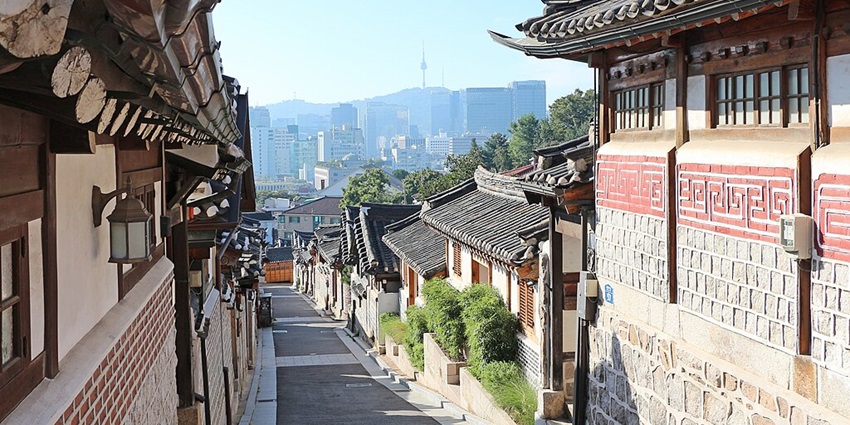
Photo: Bgag / Wikimedia Commons
Bukchon Hanok Village, located in central Seoul, offers a glimpse into traditional Korea. This is with its preserved hanok houses displaying the country’s cultural heritage. This beautiful village is a must-see for history lovers and those eager to experience authentic Korean life. Stroll through the narrow alleys, visit the local cultural centers and enjoy a traditional tea house. It’s one of the most fascinating places to visit in South Korea that seamlessly blends past and present.
Distance From Nearest Airport: 50 km (Incheon International Airport)
Distance From Nearest Railway Station: 1 km (Anguk Station)
Timings: Open year-round; individual attractions may vary
3. Jeju Island
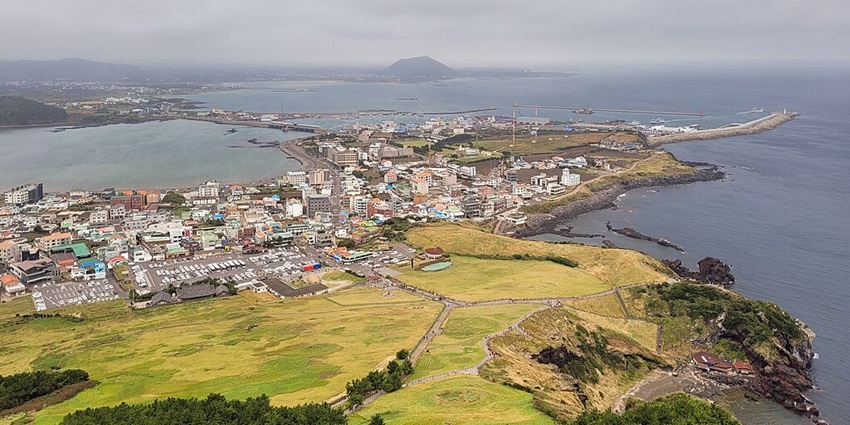
Photo: Bernard Gagnon / Wikimedia Commons
Known for its volcanic landscapes, beaches and Hallasan Mountain, Jeju Island is a paradise for nature lovers. As one of the most beautiful places to visit in South Korea, Jeju offers hiking trails, waterfalls, lava tubes and a rich cultural history. A UNESCO World Natural Heritage site, Jeju Island is perfect for outdoor activities like hiking and beach sports. The best time to visit is between April and June when the weather is mild, and the flowers are in bloom.
Distance From Nearest Airport: 60 km (Jeju International Airport)
Distance From Nearest Railway Station: N/A (island location)
Timings: Open year-round; specific attractions may vary
Suggested Read: Things To Do In Jeju Island
4. Busan
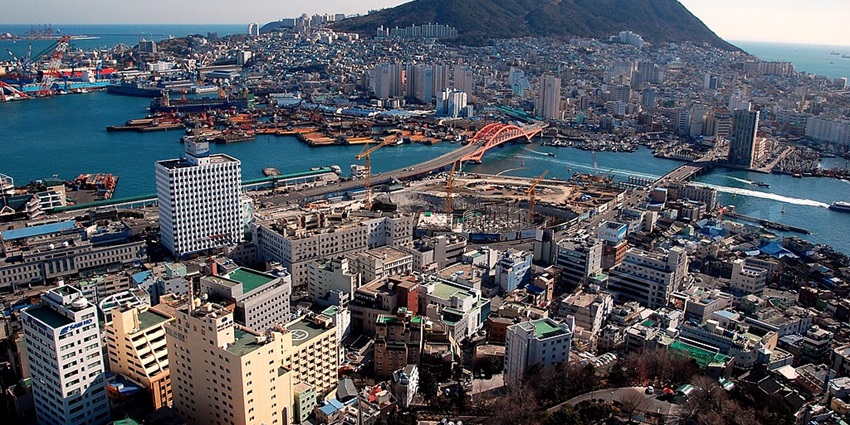
Photo: by lwy / Wikimedia Commons
South Korea’s second-largest city, Busan is known for its stunning beaches, seafood, and colorful cultural scene. From the sandy shores of Haeundae Beach to the busy Jagalchi Fish Market, there is much to explore in this coastal metropolis. Whether you’re into beach activities or cultural exploration, Busan is one of the most exciting places to visit in South Korea. The city is also famous for its dynamic arts and entertainment districts.
Distance From Nearest Airport: 20 km (Gimhae International Airport)
Distance From Nearest Railway Station: 5 km (Busan Station)
Timings: Open year-round; specific attractions may vary
5. N Seoul Tower
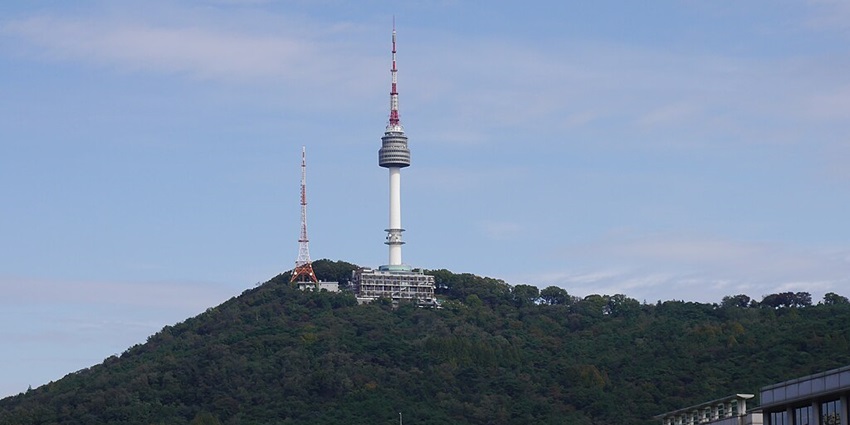
Photo: EasyKL / Wikimedia Commonsikipedia
N Seoul Tower, located atop Namsan Mountain, is one of the most iconic landmarks in Seoul. Offering amazing views of the city, it’s a perfect place for those looking to see Seoul from above. A must-see for visitors exploring places to visit in South Korea, N Seoul Tower also features dining options and the famous “love lock” area. Visiting in the evening offers the best views, with the city lights shimmering in the distance.
Distance From Nearest Airport: 50 km (Incheon International Airport)
Distance From Nearest Railway Station: 2 km (Myeongdong Station)
Timings: 10 AM – 11 PM
Suggested Read: Beaches In South Korea To Witness Endless Blue Lagoons
6. Changdeokgung Palace
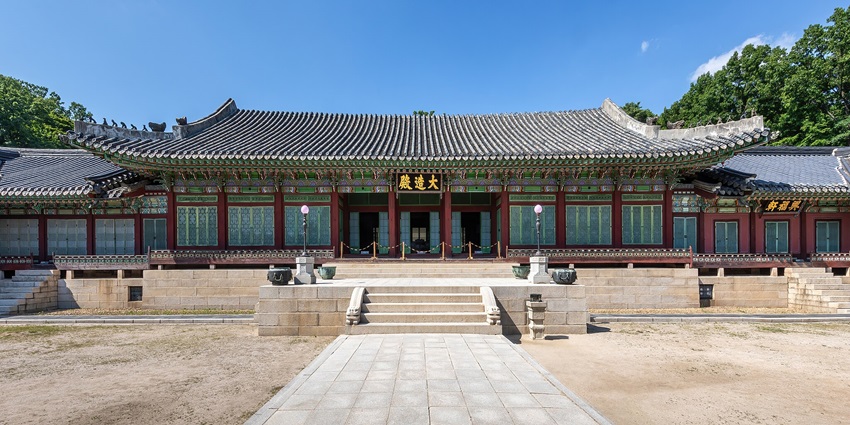
Photo: Basile Morin / Wikimedia Commons
Changdeokgung Palace, a UNESCO World Heritage site, is famous for its beautiful Secret Garden and traditional Korean architecture. As one of the finest places to visit in South Korea, the palace grounds reflect the elegance and tranquility of Korea’s royal history. A highlight is the Secret Garden, a peaceful escape within the city, perfect for a relaxing stroll. Visit during spring or fall to enjoy the changing seasons and cherry blossoms.
Distance From Nearest Airport: 50 km (Incheon International Airport)
Distance From Nearest Railway Station: 1 km (Anguk Station)
Timings: 9 AM – 6 PM (closed on Mondays)
7. Bulguksa Temple
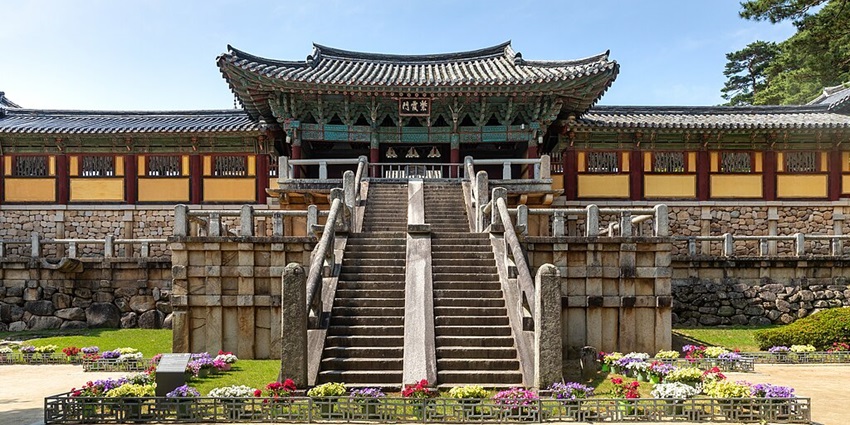
Photo: Basile Morin / Wikimedia Commons
Bulguksa Temple, located in Gyeongju, is a UNESCO World Heritage site well known for its intricate stone pagodas and calm surroundings. A visit here offers a glimpse into Korean Buddhism and the artistry of temple architecture. Bulguksa Temple is one of the top places to visit in South Korea, especially for those interested in spirituality and history. With the best time to visit being April to November, it is one of the famous places for South Korea trip
Distance From Nearest Airport: 80 km (Gyeongju Airport)
Distance From Nearest Railway Station: 15 km (Gyeongju Station)
Timings: 7 AM – 6 PM
Suggested Read: Places To Visit in Seoul In March
8. Hwaseong Fortress
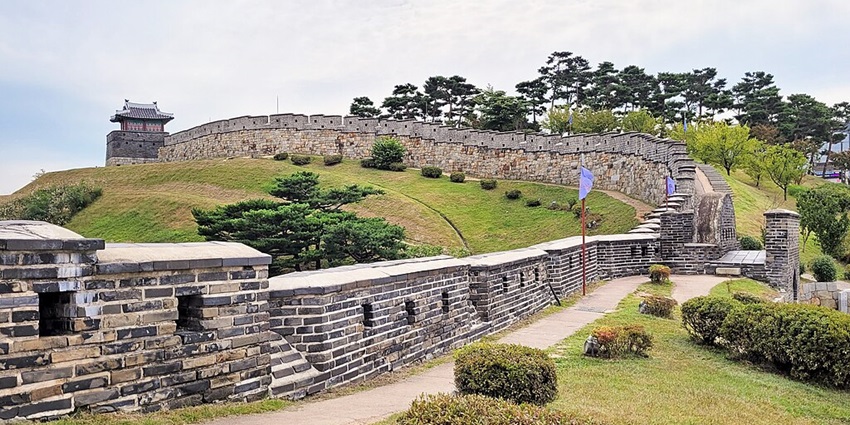
Photo: Bernard Gagnon / Wikimedia Commons
Hwaseong Fortress in Suwon, a UNESCO World Heritage site, is an incredible example of 18th-century military architecture and one of the top tourist places in South Korea. The fortress walls and gates are impressive, and walking along them offers a chance to soak in the historical atmosphere. As one of the most important places to visit in South Korea, it’s an essential stop for anyone interested in Korea’s ancient fortifications.
Distance From Nearest Airport: 50 km (Incheon International Airport)
Distance From Nearest Railway Station: 5 km (Suwon Station)
Timings: Open year-round; specific sites may have varying hours
9. Gyeongju
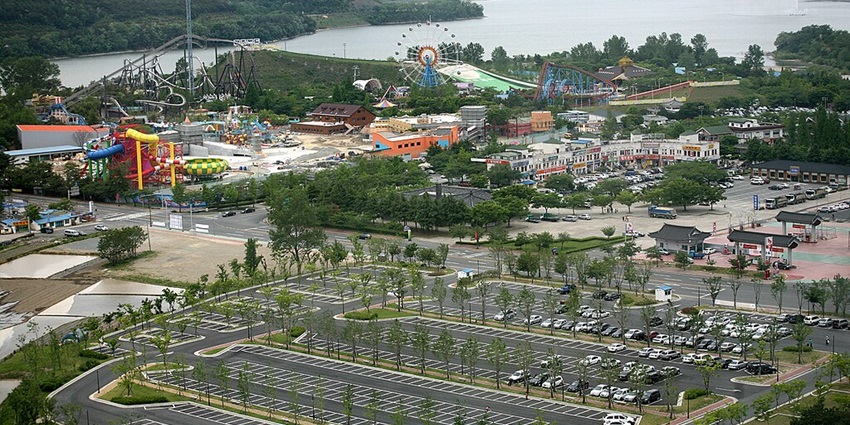
Photo: by Junho Jung / Wikimedia Commons
Gyeongju, often called “the museum without walls,” is a treasure trove of history from Korea’s Silla Kingdom. The city is filled with ancient tombs, beautiful temples, and fascinating museums, making it a paradise for history enthusiasts. Key attractions include Bulguksa Temple, Seokguram Grotto and the peaceful Anapji Pond. Places to visit in South Korea are incomplete without a trip to Gyeongju. Visit in spring to enjoy cherry blossoms or in autumn when the weather is cool.
Distance From Nearest Airport: 80 km (Pohang Airport)
Distance From Nearest Railway Station: 5 km (Gyeongju Station)
Timings: Open year-round; specific sites may vary in hours
Suggested Read: Best Hidden Places To Visit In Seoul For An Unforgettable Trip
10. Dadohaehaesang National Park
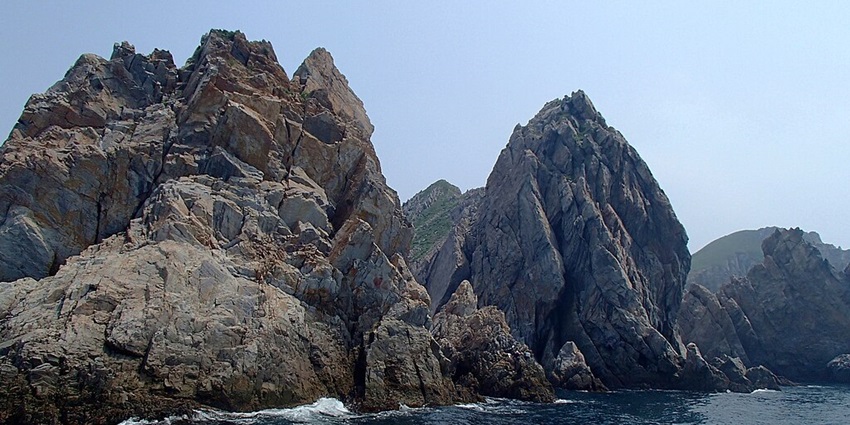
Photo: Lcarrion88 / Wikimedia Commons
Dadohaehaesang National Park is a beautiful marine park in South Korea, known for its crystal-clear waters, islands and diverse marine life. The park offers stunning views and activities like boating, kayaking and snorkelling, making it a great spot for nature lovers. As one of the most exciting places to visit in South Korea, it attracts visitors looking for both fun and serenity. Plan your trip between May and September to enjoy the best weather for exploring this natural paradise.
Distance From Nearest Airport: 200 km (Muan International Airport)
Distance From Nearest Railway Station: 30 km (Mokpo Station)
Timings: Open year-round; specific activities may vary in hours
Places to visit in South Korea offer something for every traveller, from historical landmarks to breathtaking natural beauty. You can explore ancient palaces, vibrant cities and scenic islands, each showcasing the culture and history of this fascinating country. Whether you’re an adventure seeker, a history buff or someone looking to relax, South Korea has it all. With TripXL’s exclusive travel packages, you can make the most of your trip and experience the best this beautiful country has to offer.
Cover Photo: Laurie Nevay / Wikimedia Commons


 WhatsApp
WhatsApp
 Twitter
Twitter









